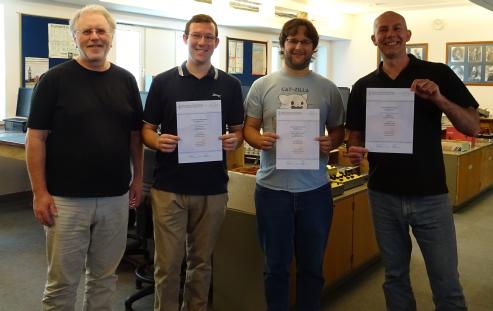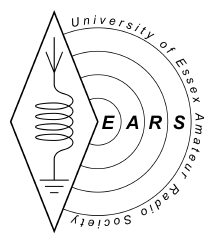EARS is able to run courses at all three grades, and some EARS members are registered instructors with RSGB.
- A Foundation course is an introduction to amateur radio. In it, you learn about the nature of amateur radio, an introduction to the underlying principles, and a little of the regulatory framework — it's not quite as dry as it seems. You also learn to operate radios on the short wave and VHF wavebands and to send and receive (slow) morse code. A typical Foundation course is about a dozen hours of study and practice and is well within the each of anyone: the youngest person obtain a Foundation licence is aged about 8!
- An Intermediate course bulids on the fundamentals learnt in the Foundation course. It extends knowledge principally about how radios work and, to help put that into place, you have to build a something relevant to amateur radio (e.g., an AM radio or an audio amplifier) from parts. This is because a full licence allows you to build your own equipment and it's best to get those practical skills in place early.
- A Full course explores all the topics relevant to amateur radio in depth. It involves only an examination; there is no practical component. Given suitable teaching material, it is entirely possible to pass the full examination by self-study.
All of the examinations consist of multiple-choice questions. As well as studying the teaching materials (see below), it is a good idea to register with the hamtests website and see how well you do on its sample exams — there are exams for all three levels.
The current course
A course is planned for the spring term 2021. Contact Adrian Clark to find out more. The course itself is free but the cost of the examination is £27.50, which you'll have to pay yourself. You are also advised to buy a copy the RSGB Foundation book, which costs about £5.
Recent successes
During the Covid pandemic, Rob Raynor has worked through all three levels of radio qualifications and now holds a full licence and the callsign M0YNW. Ian Dukes also managed to find the time to take his advanced exam and is now M0UEI.
On 9th July 2018, several staff and students — Ed Brereton, Louis Clift, Ian Dukes, Cameron Kyle-Davidson, James Rains, Adam Woodhouse — all took and passed their Intermediate examinations. In addition, Michael Walton and Stefan Marincas took their Foundation examinations and passed them with flying colours.
Three Essex staff — Louis Clift, Ed Brereton and Ian Dukes, pictured below with instructor Adrian Clark — all passed their Foundation exams over the 2017 summer vacation and now hold amateur radio licences from Ofcom. All passed with flying colours, amassing only one incorrect answer between the three of them!

Foundation course teaching material
We use the excellent Foundation course material provided by the Chelmsford Amateur Radio Society:
